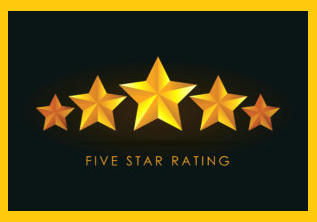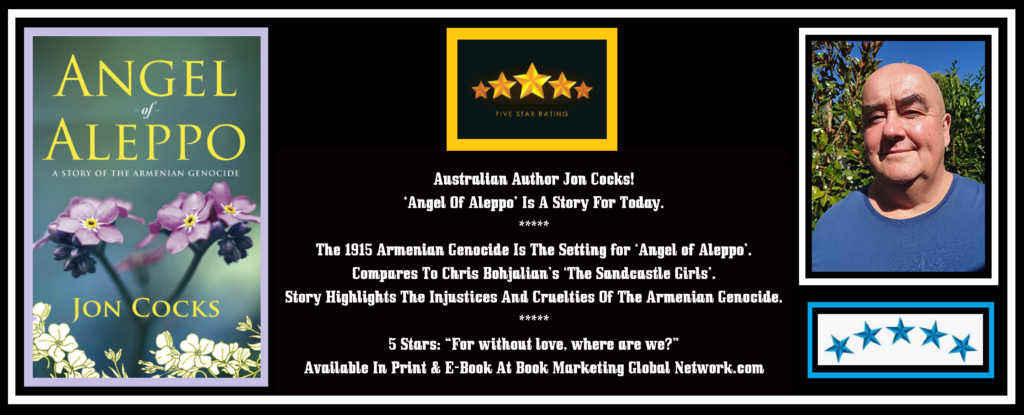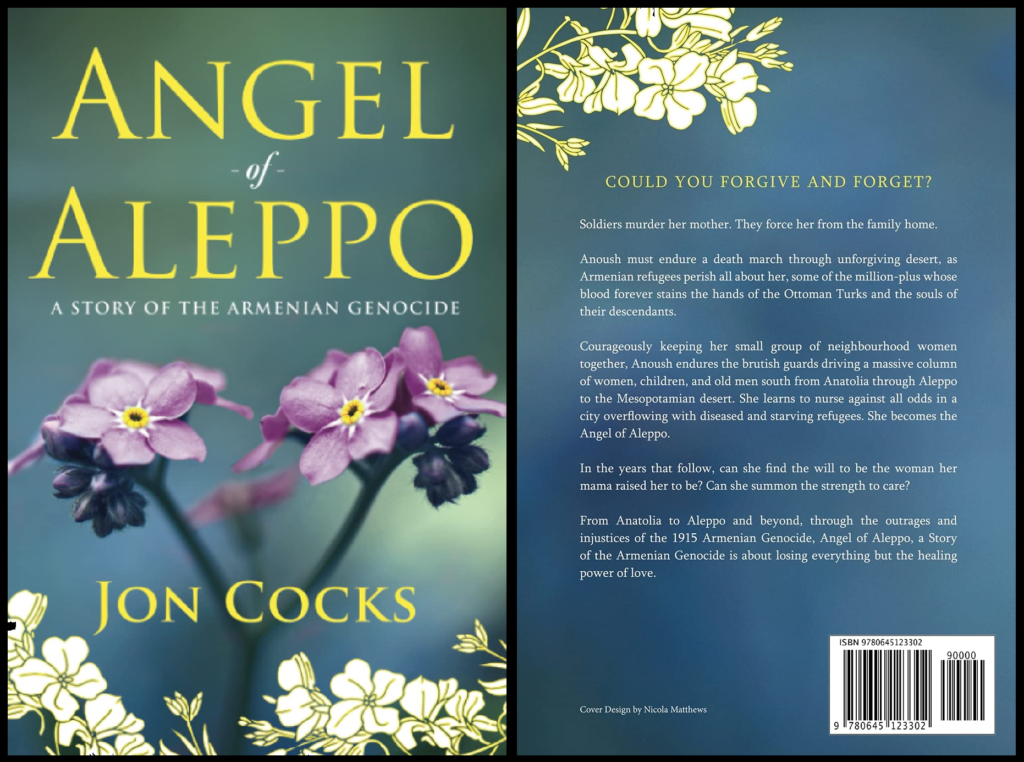Australian Author Jon Cocks!
The 1915 Armenian Genocide Is The Setting for ‘Angel of Aleppo’.
Compares To Chris Bohjalian’s ‘The Sandcastle Girls’.
Story Highlights The Injustices And Cruelties Of The Armenian Genocide.
Angel Of Aleppo Is A Story For Today…
My novel Angel of Aleppo is a story for today, despite it being set over a hundred years ago. While it is ultimately about how the power of love allows survival against well-nigh impossible circumstance, it is also about the perennial suffering of the small and relatively helpless against the juggernaut of persecution and exploitation.
There is little material gain to be had as a return on providing help for Armenia, an uncomfortable truth that concerns small, unimportant nations and their human rights. Every living Armenian is affected to this day by the unaccounted-for mass killings of 1.5 million Armenians from 1915-22 by Ottoman Empire Turks and their hired Kurdish thugs, their surviving community ignored in the wash-up by the Versailles powerbrokers and border-bargainers.
Modern-day Turks deny their crimes against Armenians of a century ago and the leaders of the civilised world do little to call them and their lapdogs in Azerbaijan out over continued neo-genocidal behaviours against Armenia. And because of the accident of oil around Baku that enriches the Azeris, they can get away with it.
For many centuries the Armenian homeland sat at the crossroads of East and West on the Silk Road between the Black Sea and the Caspian Sea, invaded and conquered time and time again to the point that Armenians no longer owned their own sovereign land, but found themselves by the nineteenth century spread diaspora-style throughout the Ottoman Empire, and in locations ranging from Venice to Paris.
Interior Talaat Pasha ordered the long-planned, systematic killings of Armenians to begin on April 24, 1915, murders that would continue throughout Anatolia for the duration of World War One and beyond it. Talaat’s twisted motives included a desire for ethnic cleansing and removal of the non-Islamic element of Ottoman society. It echoed on a much broader scale the massacres in Armenian village quarters throughout the latter stages of the nineteenth century ordered by the increasingly demented Sultan Abdul Hamid II, before the political rise of the ‘Young Turks’ consigned the aged ruler to figurehead status only.
After the Ottoman surrender to the Allies in 1918, the sole undefeated Ottoman General Mustafa Kemal rallied the surviving troops in Anatolia and single-mindedly called on them to resist the Versailles-ordained break-up of the Ottoman Empire. Significant in Kemal’s actions from 1919-22 was the continued murdering of Armenians, while resisting British, French, Italian and Greek occupation and stealing untold amounts of ancestral Armenian family property and gold.
When opening his inaugural Turkish Republic parliament as its founding president, Kemal drilled into his Cabinet of fellow war criminals the maxim that in the coming years there would be accusations about mass killings of Armenians, but the official position would be: bad things happen in war. This became the official Turkish position, and it has remained the same since then.
International indifference to Armenia became set in stone after the collapse of the Treaty of Sevres in 1920. Instead of Armenia being guaranteed fair borders, independent nation status and their own homeland in what was once an ancient empire to rival that of Rome, Armenia’s under-sized, short-lived, land-locked republic of 1920 was incorporated into the new USSR.
In addition, Joseph Stalin, oblivious to the truths of Armenian history, bribed stateless Tartar tribes around the Caspian Sea with the ancestral Armenian lands of Artsakh immediately east of modern Armenia, from then on to be part of new Soviet member republic Azerbaijan.
The pan-Turkic people of Baku and surrounds took the bone that Stalin threw them. They began increasingly methodical acts of cultural genocide over the century that followed, erasing the truth, obliterating evidence of Armenian culture from the map by vandalising ancient Armenian Christian relics and monasteries of Artsakh. Azeri persecution of Armenians in this territory has continued until the present.
Nowadays, the very word ‘genocide’ is banned from verbal discourse in Türkiye. In January 2007 Turkish-Armenian journalist and reconciliation advocate Hrant Dink was murdered for daring to suggest genocide recognition. His killer walked free.
By the genocide’s 2015 centenary some 28 European and South American nations had acknowledged the Turkish atrocities as genocide, each provoking anger in Ankara. On the 106th anniversary of the Armenian Genocide commemoration, under intense American-Armenian diasporan lobbying, US President Biden proclaimed: ‘each year on this day, we remember the lives of all those who died in the Ottoman-era Armenian Genocide.’ But American recognition is foiled by the NATO alliance and its geopolitically driven military presence in the Republic of Türkiye.
Continued anti-Armenian aggression from Türkiye and its puppet-ally Azerbaijan and absence of interest from neoliberal agenda-driven global mainstream media come as no surprise, but Azerbaijan’s 2020 September 27 to November 10 war, a military action backed by Türkiye, was a modern-day outrage of genocidal intent of which only a minimal percentage of the greater world population was even aware. With Syrian mercenaries allegedly on a pro rata bounty based on Armenians killed, the Azeris succeeded in taking back lands between Artsakh and Armenia lost in the 1991-94 territorial war following the breakup of the Soviet Union.
The sole road through Azerbaijan in and out of Armenia, known as the Lachin Corridor, was blocked in mid-December 2022 by Azeri troops, cynically characterising themselves as ‘concerned environmentalists’. It denied Armenians in Artsakh food, medical supplies and even running water, ultimately driving most of them from their homes.
On February 22, 2023, the International Court of Justice ruled that Azerbaijan should guarantee free movement along the Lachin Corridor, but – unlike the Ukrainian struggle against Russian invasion – no practical international assistance was forthcoming. The United States and France criticised Azerbaijan’s establishment of a checkpoint on the Lachin Corridor and called for free movement of people and commerce along the route. Both nations confined themselves to mild diplomatic rebukes over these flagrant abuses of human rights.
Azerbaijan succeeded by late 2023 in ousting the majority of Arsakh’s 120,000 population, which forced neighbouring Armenia to accommodate somehow an immediate and sudden refugee population explosion.
Armenia is under mounting pressure in the east from Azerbaijan’s dictator Ilham Aliyev, who wants to create a checkpoint-free east-west corridor through Armenia’s southern-most Syunik province to its exclave Nakhchivan Autonomous Republic. Aliyev is adept at rewriting history in his pronouncements, brazenly insisting that centuries-old ancestral Armenian lands were always those of Azerbaijan, despite the latter only being an actual independent nation since the 1990 Soviet breakup. And Türkiye sits on the other side of Armenia, behind a border closed for than a hundred years, cynically monitoring the small, impoverished republic’s increasingly desperate struggles to remain independent.
My novel tells a story of one woman against a backdrop of genocide. But every Armenian family has a story. My desire is for readers who love a compelling story to embrace mine and become advocates for some justice for Armenia.
About Jon Cocks: Jon Cocks taught secondary Drama and English for many years. Angel of Aleppo, a Story of the Armenian Genocide is his first full-length novel. He has unpublished cartoon strips, a long list of credits in community theatre, a long-running TV ad, several one-act plays written for students and a novella about being a teacher called Duty of Care. Other than an enduring love affair with his Armenian-born wife Lilit, Jon loves books, theatre, movies, the Adelaide Crows, cricket, and wine.
Angel of Aleppo by Jon Cocks.
A Story of the Armenian Genocide.
Soldiers murder her mother. They force her from the family home.
Anoush must endure a death march through unforgiving desert, as Armenian refugees perish all about her, some of the million-plus whose blood forever stains the hands of the Ottoman Turks and the souls of their descendants.
Courageously keeping her small group of neighbourhood women together, Anoush endures the brutish guards driving a massive column of women, children, and old men south from Anatolia through Aleppo to the Mesopotamian desert. She learns to nurse against all odds in a city overflowing with diseased and starving refugees. She becomes the Angel of Aleppo.
In the years that follow, can she find the will to be the woman her mama raised her to be? Can she summon the strength to care?
From Anatolia to Aleppo and beyond, through the outrages and injustices of the 1915 Armenian Genocide, Angel of Aleppo, a Story of the Armenian Genocide is about losing everything but the healing power of love.

Review by Literary Titan: Emotionally charged historical fiction that feels like it’s a true story… the writing is wonderful.
Review by Glam Adelaide: Reads like a thriller except that, tragically, it is based on truth…belongs on the big screen…How can so many of us not know about this?
Review by Readers’ Favorite: A must-read for readers who enjoy historical fiction. I found it absolutely riveting and highly recommend it.

5 Stars: “For without love, where are we?”
‘Angel of Aleppo’ is a profoundly thought-provoking account that speaks to the horror of the Armenian Genocide, which preceded Adolf Hitler’s Holocaust.
Author Jon Cocks demonstrates his impeccable research, as even today, there are those in Turkey who still deny their own history. With clarity of mind, heart, and soul this author masterfully brings his readers back to 1915. This story is so intense, the scenes so clear, your mind will act as the silver screen. For those of us who will never travel to the War Memorial on North Terrace in Adelaide, South Australia, Jon Cocks is on a mission to honor the estimated 1.5 million Armenians who were tortured and killed. Adelaide’s memorial is like the Cenotaph in London. It carries the names of fallen SA soldiers. Anoush goes there as it is the only place, she can think of to honour Thomas, who was a belated war casualty.
It is important for you to know that ‘Angel of Aleppo’ was inspired by the author’s wife Lilit’s grandmother Anoush, a survivor of the Armenian Genocide, who lost her own mother in 1915. Every living Armenian remains affected by the genocide, now four generations ago.
As you read ‘Angel of Aleppo’ you will be reminded that “Faith’s light can lift the darkest soul. Faith’s fire can warm the coldest heart. Faith, it is said, can move mountains.”
I invite you to walk alongside a nurse named Anoush, as this is her story. Watch her bring love and compassion to others, as horrific events unfold around her. ‘Angel of Aleppo’ is a brutally honest account that will stir deep emotion. It should serve as a stark reminder not to cover up or deny history.
The author has placed a wonderful glossary of Armenian, Turkish and German words at the end of this book. I suggest you familiarize yourself with it before you begin reading.
Jon Cocks taught secondary Drama and English for many years. He has unpublished cartoon strips, a long list of credits in community theatre, a long-running TV ad, several one-act plays written for students, and a novella about being a teacher called ‘Duty of Care’. Other than an enduring love affair with his Armenian-born wife Lilit, Jon loves books, theatre, movies, the Adelaide Crows, cricket, and wine.
I highly recommend this book to those of you who want to know history and also those of you who are determined to teach upcoming generations about the horror of genocide and the value of faith.
Editorial Review (Book Marketing Global Network).
From the Author: The story of Angel of Aleppo was inspired by my Armenian wife Lilit’s own grandmother Anoush, who witnessed a Turkish soldier murder her own mother in 1915. Few Australians know the other April 1915 story, the April 24, 1915 slaughter of Armenians in the Ottoman Empire, initially smoke-screened by the Dardanelles campaign. Turkish leaders instigated a long-formulated plan to begin murdering Armenians, because the world’s attention was on the Dardanelles. Few Australians know of Armenia, let alone the unacknowledged genocide that tortures its national soul. Once I had come to understand the Australian connection, and mindful – in June 2014 – that the 2015 centenary commemoration of the Armenian Genocide was looming, the idea to stage a play formed in my mind. The Armenian Cultural Association of SA worked with me in Adelaide to stage my 75-minute play to commemorate the centenary of the Armenian Genocide in 2015. The play’s action centred around a confrontation at the SA War Memorial on North Tce between an elderly Armenian woman and an elderly Turkish man on the fiftieth anniversary of the genocide: April 24, 1965. After the group performed the play successfully in Adelaide and to great acclaim for two performances in Sydney, Lilit and I agreed that the journey was not over. I decided to build on Anoush and write the novel.
Anoush is inspired by Lilit’s grandmother, an indomitable woman who survived the genocide, lived into her eighties and imbued love, respect and family values into every one of her 37 grandchildren. The character is sixteen when a nightmarish day changes her life forever. She suffers alone and as a part of the greater Armenian suffering, but draws on the strength of her family background in her darkest moments to prevail. I began crafting the narrative of my literary Anoush’s youthful trials during 1915-19, beginning by fleshing out experiences alluded to in her character’s dialogue from the play. A great deal of research followed in the next year and there were numerous artistic choices made. Angel has a number of cameo appearances by characters who were real life historical figures, e.g., US President Woodrow Wilson. In those instances, I research their lives and study photos of them, looking for clues to their characters in their faces. In the case of characters who are literary constructs, like Anoush, I imbue them with character-appropriate physical qualities and personality traits from actual people I know or have known. I have an image of a beautiful blonde, blue-eyed woman in my head, which no artist can realise to my satisfaction. That is why there is no image of Anoush on the cover.
The novel’s ongoing theme is the outrage that was the Armenian Genocide and the lack of recognition of it by the successors of its perpetrators. The fact that the Armenian Genocide was the first Genocide of the twentieth century is an indictment upon every overly ambitious leader who ever pulled on a jackboot and donned medals before ordering his army to murder civilians. Mass killings of people because of race or colour or other ideological and/or religious obsession are a stain what constitutes civilisation. They make a mockery of what ‘civil’ means. Those who do not study history, so the truism goes, are doomed to repeat its mistakes. And there is no shortage of well-fed, middle-aged men with imperatorial ambitions not averse to throwing the weight of their armed forces about to make an ideological point. And on a less murderous scale, but no less iniquitous, are the many neo-conservative leaders abroad today who, with the financial support and particular concerns of their billionaire friends as influences, use government machinery and ideological justification to deny a decent living to large sectors of their populations. Social justice is a commodity sorely lacking in this post-modern world of materialist obsession that so often overshadows simple humanity.
And this brings me to the most important theme of all, that of love, an emotion so enduring and so powerful in its purest form that it can prevail against the most appalling disasters and hateful crimes. Anoush suffers like few have suffered, but the power of the love in her heart sees her through. For without love, were, are we?

Review by Dean Chavooshian: 5.0 out of 5 Stars. “I pray and ask why innocent people must die for no reason”. Reviewed in the United States on June 24, 2021. This is a story that must be told! A story that has been denied – but should never be forgotten. A story that is a window into the human condition of love and hate. A story of strength in the long, dark, shadow of despair. A story that altered the trajectory of world history.
Jon Cocks has written a masterful book titled Angel of Aleppo, chronicling the life and deeds of a nurse named Anoush who survives the real-life horrors of a meaningless war. In 1915, during World War 1, the Ottoman government of Turkey orchestrated the first genocide of the twentieth century against their Armenian population. It is estimated that 1.5 million Armenians were sought out, round up, unmercifully killed, and forced to endure endless death marches through the desert where they died of starvation or worse. It is well known in 1939 that Adolf Hitler said “Who, after all, speaks today of the annihilation of the Armenians” – paving the way for the horrors of the Holocaust.
The reader follows the life of a nurse named Anoush as she witnesses all these horrific events, including the brutal murder of her mother. She unselfishly helps others and becomes the embodiment of love, compassion and understanding, reaching mythical status as the Angel of Aleppo. The writing is compelling and deep with emotion, so much so that I needed to put the book down from time to time to catch my breath and remember how cruel life can be.
As a second-generation Armenian myself, I have heard all the stories of death and survival from my grandparents on both sides. They struggled for years to make their way west to America and start a new life, although my grandfather on my father’s side was so embittered, he joined the French Foreign Legion to go back to Turkey. In America, and in all diaspora locations, Armenians persevered mightily and maintained their rich culture. The protagonist Anoush exhibited a similar deep inner strength to endure even the harshest of life’s events – with dignity and purpose.
I hope many people read Jon’s book to help better understand a piece of forgotten history, still denied by Turkey today. He has done an admirable job in his research. I hope many people read Jon’s book as a vivid reminder that compassion trumps hate. It’s a theme worth remembering always. I also hope the book is appreciated for its rich and captivating prose.
Review by Irene Korsten: 5.0 out of 5 Stars. Dramatic and startling read. Reviewed in the United States on November 21, 2021. I highly recommend Angel of Aleppo. Jon’s research and writing are second to none. His heart and soul are clearly embedded in this story. A difficult and important subject matter (one that is sadly, not being acknowledged as it should be across the globe) handled incredibly well.
From the Author: The story of Angel of Aleppo was inspired by my Armenian wife Lilit’s own grandmother Anoush, who witnessed a Turkish soldier murder her own mother in 1915. Few Australians know the other April 1915 story, the April 24, 1915, slaughter of Armenians in the Ottoman Empire, initially smoke-screened by the Dardanelles campaign. Turkish leaders instigated a long-formulated plan to begin murdering Armenians, because the world’s attention was on the Dardanelles. Few Australians know of Armenia, let alone the unacknowledged genocide that tortures its national soul. Once I had come to understand the Australian connection, and mindful – in June 2014 – that the 2015 centenary commemoration of the Armenian Genocide was looming, the idea to stage a play formed in my mind. The Armenian Cultural Association of SA worked with me in Adelaide to stage my 75-minute play to commemorate the centenary of the Armenian Genocide in 2015. The play’s action centered around a confrontation at the SA War Memorial on North Tce between an elderly Armenian woman and an elderly Turkish man on the fiftieth anniversary of the genocide: April 24, 1965. After the group performed the play successfully in Adelaide and to great acclaim for two performances in Sydney, Lilit and I agreed that the journey was not over. I decided to build on Anoush and write the novel.
Anoush is inspired by Lilit’s grandmother, an indomitable woman who survived the genocide, lived into her eighties, and imbued love, respect, and family values into every one of her 37 grandchildren. The character is sixteen when a nightmarish day changes her life forever. She suffers alone and as a part of the greater Armenian suffering but draws on the strength of her family background in her darkest moments to prevail. I began crafting the narrative of my literary Anoush’s youthful trials during 1915-19, beginning by fleshing out experiences alluded to in her character’s dialogue from the play. A great deal of research followed in the next year and there were numerous artistic choices made. Angel has a number of cameo appearances by characters who were real life historical figures, e.g., US President Woodrow Wilson. In those instances, I research their lives and study photos of them, looking for clues to their characters in their faces. In the case of characters who are literary constructs, like Anoush, I imbue them with character-appropriate physical qualities and personality traits from actual people I know or have known. I have an image of a beautiful blonde, blue-eyed woman in my head, which no artist can realize to my satisfaction. That is why there is no image of Anoush on the cover.
The novel’s ongoing theme is the outrage that was the Armenian Genocide and the lack of recognition of it by the successors of its perpetrators. The fact that the Armenian Genocide was the first Genocide of the twentieth century is an indictment upon every overly ambitious leader who ever pulled on a jackboot and donned medals before ordering his army to murder civilians. Mass killings of people because of race or colour or other ideological and/or religious obsession are a stain what constitutes civilisation. They make a mockery of what ‘civil’ means. Those who do not study history, so the truism goes, are doomed to repeat its mistakes. And there is no shortage of well-fed, middle-aged men with imperatorial ambitions not averse to throwing the weight of their armed forces about to make an ideological point. And on a less murderous scale, but no less iniquitous, are the many neo-conservative leaders abroad today who, with the financial support and particular concerns of their billionaire friends as influences, use government machinery and ideological justification to deny a decent living to large sectors of their populations. Social justice is a commodity sorely lacking in this post-modern world of materialist obsession that so often overshadows simple humanity.
And this brings me to the most important theme of all, that of love, an emotion so enduring and so powerful in its purest form that it can prevail against the most appalling disasters and hateful crimes. Anoush suffers like few have suffered, but the power of the love in her heart sees her through. For without love, were, are we?
Product Details:
Paperback: 328 Pages
Publisher: JC Books (May 8, 2021)
Language: English
Fiction (Cultural Heritage)
Historical (Armenian Genocide Fiction Based On Truth)
Customer Ratings:
https://www.amazon.com/Angel-Aleppo-Story-Armenian-Genocide/dp/0645123307/ref=tmm_pap_swatch_0?_encoding=UTF8&qid=1639669024&sr=8-1#customerReviews

About Jon Cocks: Jon Cocks taught secondary Drama and English for many years. Angel of Aleppo, a Story of the Armenian Genocide is his first full-length novel. He has unpublished cartoon strips, a long list of credits in community theatre, a long-running TV ad, several one-act plays written for students and a novella about being a teacher called Duty of Care. Other than an enduring love affair with his Armenian-born wife Lilit, Jon loves books, theatre, movies, the Adelaide Crows, cricket and wine.
Amazon Author’s Page:
https://www.amazon.com/Jon-Cocks/e/B094MXD1S3/ref=dp_byline_cont_pop_ebooks_1
Amazon Author’s Page:
https://www.amazon.com/Jonathan-Gordon-Cocks/e/B093GJMH1G/ref=dp_byline_cont_pop_book_1
Author’s Page At Book Marketing Global Network:
https://bookmarketingglobalnetwork.com/book-marketing-global-network/jon-cocks-books/


